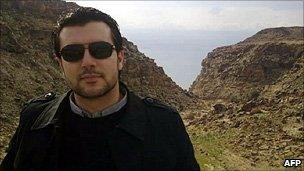How widespread is campus extremism?
- Published
A delayed report on how to tackle violent extremism on university campuses is expected to be published soon. But there is still widespread disagreement about how serious the problem of "radicalisation" is.

Are universities the place where extremists get "radicalised"?
This time last year the square behind London's City University was the scene of a confrontation, between some Muslim students and the university authorities.
In a case study, the counter-extremism think tank Quilliam claimed an Islamic society at City University, headed by a charismatic leader, capitalised on a row over a prayer room.
Muslim students protested by praying on the street in the square. Some think it was a period when conditions on the campus were ripe for radicalisation.
"Universities are places where young people come together, meet one another, become enthused, and of course, to use that word, they can become 'radicalised'", former Vice Chancellor Julius Weinberg told the BBC. He was in charge at the university at the time.
"In my day we sat in because of the US involvement in Vietnam. Students are passionate young people and they should be."
Radical positions
But they did not go on to try to blow themselves up on planes did they?
"I think if you were to look back in history many 'terrorists', many of those who've taken radical positions, will have been to university. That does not mean they were radicalised at university."
The government and the Security Service MI5 are worried about some universities, worried enough to offer them money.
The Department of Business, Innovation and Skills has confirmed that 39 universities have been offered extra funding to improve staff training because, to use the government's words, they "might be at risk".
The Universities Minister David Willetts does not believe there is a pattern.
"It certainly does look as if there are individual incidents when young people may have been radicalised on campus," he said.
"But it's very hard to pin down, when an individual goes off the rails like that, exactly what has triggered it."
The most recent case was the alleged "underpants bomber", Nigerian Umar Farouk Abdulmutallab. He had been a student at University College London and deeply involved with its Islamic Society.
Liquid bomb plot
The British-based man Taimour Abdulwahab al-Abdaly, who blew himself up in Sweden last December, had been a student at university in Luton. He was involved in an Islamic Society there before he was forced out of his local mosque because of his extreme views.
Prime Minister David Cameron is in no doubt that there is a problem. Before Christmas he told Parliament the government needs to make sure "we de-radicalise our universities".
But the universities minister is not so sure. David Willetts explained how he reacts to such cases.

Taimour Abdulwahab al-Abdaly had been a student in Luton
"I then ask the experts and the Security Services 'what caused this to happen?' Do we know that this person was radicalised as a result of being at a British university?... It is quite hard to pinpoint whether the university experience was the specific trigger."
UCL's own inquiry concluded Abdulmutallab had not been radicalised during his time at the university.
But just a few miles north at another university there is a different view. London Metropolitan University sits next door to Arsenal's Emirates Stadium. One of the men convicted last year over the airline liquid bomb plot was a student at London Met; he ran the Islamic Society during his time as a student.
London Met's Muslim chaplain Musa Admani would not do an interview with the BBC but he did tell me in a telephone conversation that he is on the record as having concerns about radicalisation on campus.
A Muslim chaplain at another university told me how difficult it was to identify people like him.
Asgar Rajput said: "It's really difficult to find out who is vulnerable or not." He is considered by some in the world of community relations and counter-terrorism to be "at the coal face".
The university where he works in west London has had well-documented problems in the past but now he does not see evidence of that.
"Having been a chaplain for over six years I haven't been approached by anyone."
UK universities is expected to report back soon with its assessment on dealing with radicalisation.
Tougher scrutiny of external speakers is expected to be one key recommendation. But while David Cameron talks of the need to "de-radicalise" universities, his minister in charge of them insists there is no proof yet of a pattern of radicalisation on campuses across the UK.